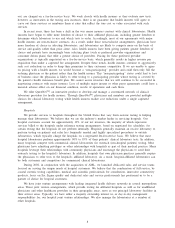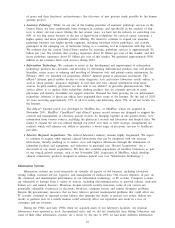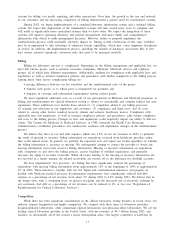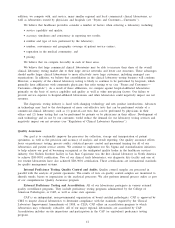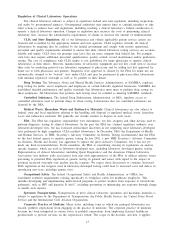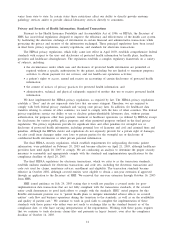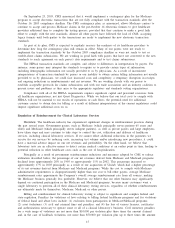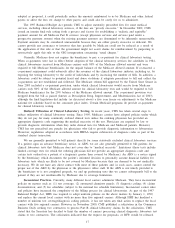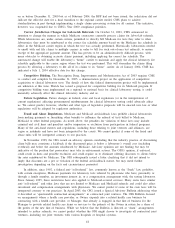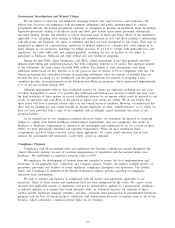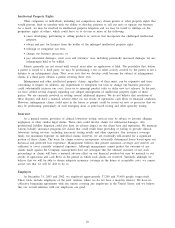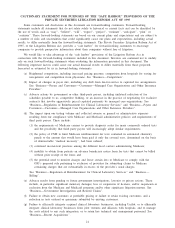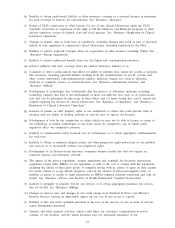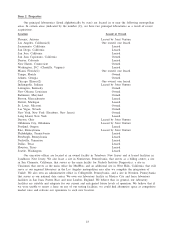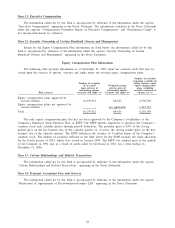Quest Diagnostics 2003 Annual Report Download - page 35
Download and view the complete annual report
Please find page 35 of the 2003 Quest Diagnostics annual report below. You can navigate through the pages in the report by either clicking on the pages listed below, or by using the keyword search tool below to find specific information within the annual report.on or before December 31, 2000 but as of February 2004, the RFP had not been issued; the solicitation did not
indicate the effective date for a final transition to the regional carrier model. CMS plans to achieve
standardization in part through implementing a single claims processing system for all carriers. This initiative,
however, was suspended due to CMS’s Year 2000 compliance priorities.
Carrier Jurisdiction Changes for Lab-to-lab Referrals. On October 31, 2003, CMS announced its
intention to change the manner in which Medicare contractors currently process claims for lab-to-lab referrals.
While laboratories are, under certain criteria, permitted to directly bill Medicare for tests they refer to other
laboratories, they must be reimbursed at the correct fee schedule amount based on the Medicare fee schedule in
effect in the Medicare carrier region in which the test was actually performed. Historically, laboratories needed
to enroll with and file claims to multiple carriers in order to bill for such out-of-area test referrals, to ensure
receipt of the appropriate payment amount. This has proven to be an administratively difficult process, with
many obstacles to obtaining accurate claims payment, including applying the correct fee schedule. The
announced change will enable the laboratory’s “home’’ carrier to maintain and apply the clinical laboratory fee
schedule applicable to the carrier region where the test was performed. This will streamline the claims filing
process by allowing a laboratory to file all of its claims to its “home’’ carrier. As of January 2004, CMS has
indicated a July 1, 2004 effective date for this change.
Competitive Bidding. The Prescription Drug, Improvement and Modernization Act of 2003 requires CMS
to conduct and complete by December 31, 2005, a demonstration project on the application of competitive
acquisition to clinical laboratory tests. The details of how this federal demonstration project will be implemented
are unknown at this time. Florida has issued a proposal for competitive bidding for its Medicaid program. If
competitive bidding were implemented on a regional or national basis for clinical laboratory testing, it could
materially adversely affect the clinical laboratory industry and us.
Future Legislation. Future changes in federal, state and local regulations (or in the interpretation of
current regulations) affecting governmental reimbursement for clinical laboratory testing could adversely affect
us. We cannot predict, however, whether and what type of legislative proposals will be enacted into law or what
regulations will be adopted by regulatory authorities.
Fraud and Abuse Regulations. Medicare and Medicaid anti-kickback laws prohibit clinical laboratories
from making payments or furnishing other benefits to influence the referral of tests billed to Medicare,
Medicaid or other federal programs. As noted above, the penalties for violation of these laws may include
criminal and civil fines and penalties and/or suspension or exclusion from participation in federal programs.
Many of the anti-fraud statutes and regulations, including those relating to joint ventures and alliances, are
vague or indefinite and have not been interpreted by the courts. We cannot predict if some of the fraud and
abuse rules will be interpreted contrary to our practices.
In November 1999, the OIG issued an advisory opinion concluding that the industry practice of discounting
client bills may constitute a kickback if the discounted price is below a laboratory’s overall cost (including
overhead) and below the amounts reimbursed by Medicare. Advisory opinions are not binding but may be
indicative of the position that prosecutors may take in enforcement actions. The OIG’s opinion, if enforced,
could result in fines and possible exclusion and could require us to eliminate offering discounts to clients below
the rates reimbursed by Medicare. The OIG subsequently issued a letter clarifying that it did not intend to
imply that discounts are a per se violation of the federal anti-kickback statute, but may merit further
investigation depending on the facts and circumstances presented.
In addition, since 1992, a federal anti-“self-referral’’ law, commonly known as the “Stark’’ law, prohibits,
with certain exceptions, Medicare payments for laboratory tests referred by physicians who have, personally or
through a family member, an investment interest in, or a compensation arrangement with, the testing laboratory.
Since January 1995, these restrictions have also applied to Medicaid-covered services. Many states have similar
anti-“self-referral’’ and other laws that are not limited to Medicare and Medicaid referrals and could also affect
investment and compensation arrangements with physicians. We cannot predict if some of the state laws will be
interpreted contrary to our practices. In April 2003, the OIG issued a Special Advisory Bulletin addressing what
it described as “questionable contractual arrangements’’ in contractual joint ventures. The OIG Bulletin focused
on arrangements where a health care provider, or Owner, expands into a related health care business by
contracting with a health care provider, or Manager, that already is engaged in that line of business for the
Manager to provide related health care items or services to the patients of the Owner in return for a share of
the profits of the new line of business. While we believe that the Bulletin is directed at “sham’’ arrangements
intended to induce referrals, we cannot predict whether the OIG might choose to investigate all contractual joint
ventures, including our joint ventures with various hospitals or hospital systems.
18


